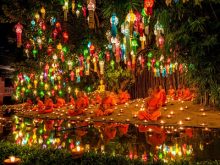 After nine months of experiencing Thailand virtually, the country has reopened its borders to travellers from the Middle East and the Tourism Authority of Thailand (TAT) is highlighting the best elements of the destination for visitors to experience. With lush nature and beautiful scenery, Chiang Mai meaning ‘New City’, is the ideal destination to embark on a one-of-a-kind adventure that is cultural and sustainable. Known for its religious sites and mountainous landscape, Chiang Mai also has a variety of local markets, hill tribe traditional weaving experiences and luxury resorts.
After nine months of experiencing Thailand virtually, the country has reopened its borders to travellers from the Middle East and the Tourism Authority of Thailand (TAT) is highlighting the best elements of the destination for visitors to experience. With lush nature and beautiful scenery, Chiang Mai meaning ‘New City’, is the ideal destination to embark on a one-of-a-kind adventure that is cultural and sustainable. Known for its religious sites and mountainous landscape, Chiang Mai also has a variety of local markets, hill tribe traditional weaving experiences and luxury resorts.
For an off-the-beaten-path retail experience, Jing Jai Market (also known as Chiang Mai’s JJ Market) is an open-air local market north of Chiang Mai’s old city that operates over the weekend where visitors can find organic produce and handmade handicrafts, or unwind at one of the cafes and restaurants in a pleasant atmosphere. In the same vicinity of the market is Chiang Mai’s largest plant and garden market that sells a variety of native plants.
Nestled in the shade of Suthep Mountain, Studio Naenna is an ethical fashion and eco textiles community of women weavers comprised of ‘Weavers For the Environment’ (WFE). The studio and store hosts a variety of textiles workshop including indigo harvesting and dying, as well as traditional Karen backstrap loom weaving workshops.
A popular upscale tourist hotspot, Koh Samui is an island off the east coast of Thailand and surrounded by over 40 other islands in the calm waters of the Gulf of Thailand. Island hopping is one of the most popular tourist activities, allowing travellers to spend time on different islands with ample opportunities to snorkel and scuba dive.
 Tourism Breaking News
Tourism Breaking News


